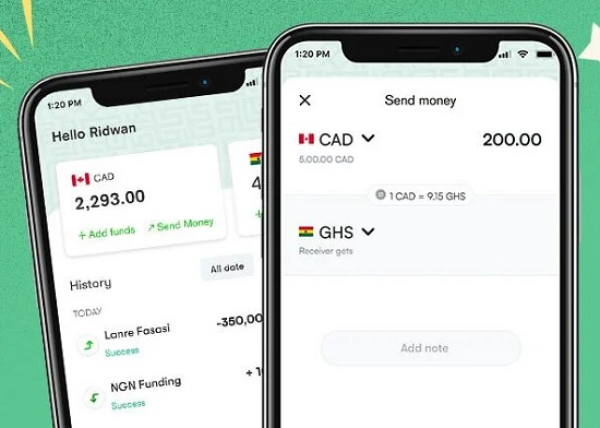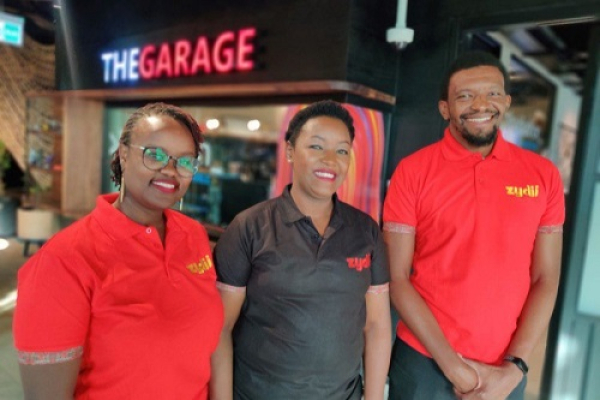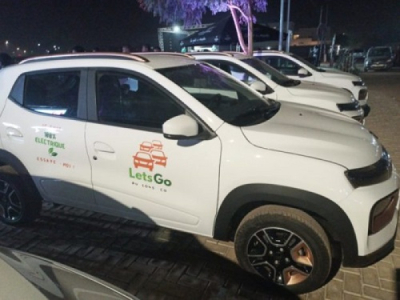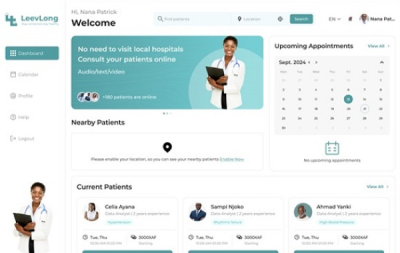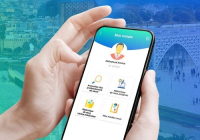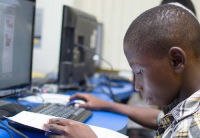
Solutions (583)
In January 2025, the fintech secured $53 million in a Series B funding round, led by Highland Europe, bringing its total funding to $85 million. The company plans to use these funds to establish itself as the primary financial services platform for immigrants.
LemFi is a fintech solution developed by a Nigerian startup, enabling diaspora communities in Europe and North America to transfer funds from African countries. Founded in 2021 by Ridwan Olalere and Rian Cochran as Lemonade Finance, the company rebranded as LemFi in 2023.
In January, the Nigerian fintech raised $53 million to develop its products, strengthen its global presence as a financial services hub for immigrants, and support its growth. "This new funding will support us in our mission to build the financial services hub for immigrants globally from adding new features to expanding to new countries," said Ridwan Olalere.
The solution features a mobile application available on iOS and Android, where it has been downloaded more than a million times, according to Play Store data. Users create an account to access LemFi’s services. In addition to international money transfers, the fintech offers the creation of international accounts, requests for money from relatives, and the generation of payment links.
Transfers via LemFi can be made directly to bank accounts, mobile wallets, or other available options. Transaction fees are nonexistent for certain destinations and relatively low for others. The Nigerian startup is backed by various entities, including the California-based accelerator Y Combinator, which selected it for its Summer 2021 cohort.
By Adoni Conrad Quenum,
Editing by Feriol Bewa
Access to quality vocational training remains a major challenge for many African workers and entrepreneurs. To address this issue, Zydii, a Kenya-based edtech company, offers an innovative solution.
Zydii, a Kenyan startup, has developed an online training platform designed to meet the needs of African professionals, including employees and entrepreneurs. Founded in Nairobi in 2021 by Joyce Mbaya and Rhoda Kingori, Zydii offers a mobile application available exclusively on Android.
According to Play Store data, the application has been downloaded approximately one hundred times. Users create an account to access various online training programs covering key areas such as personal development and leadership, digital and technological skills, and entrepreneurship and business management.
In February 2025, Zydii partnered with the talent accelerator Venture for Africa (VFA) to launch a hands-on, execution-focused go-to-market strategy course designed for African businesses. "This partnership with Venture for Africa is about giving businesses the tools to navigate real challenges, from market entry to regional expansion. Think of it as the ultimate playbook for winning in African markets," said Rhoda Kingori.
In a context where companies struggle to find talent trained in market-relevant skills, Zydii aims to bridge this gap by offering training programs tailored to the realities of the continent. The courses are designed to meet the demands of the African job market, with practical modules that can be immediately applied in a professional setting.
Zydii also collaborates with companies seeking to enhance their employees' skills. Through customized solutions, organizations can train their teams continuously and effectively, without time or location constraints.
By Adoni Conrad Quenum,
Editing by Feriol Bewa
In Burkina Faso, Patrick Paré is revolutionizing e-mobility with his new ride-hailing solution. His initiative is part of a drive to modernize urban transport while addressing the country's environmental and economic challenges.
LetsGo, an e-mobility solution developed by a Burkinabé startup, launched last week by Patrick Paré, offers eco-friendly ride-hailing services via a mobile application to residents of Ouagadougou.
"Our ambition is to redefine the standards of private transport in Africa and make every ride an exceptional experience. At LetsGo, every trip is designed to offer a unique and pleasant experience. We are committed to ensuring a high-quality service by focusing on three essential pillars: a commitment to safety, a personalized experience, and impeccable service," Paré stated.
The service is accessible through a mobile application, available on iOS and Android, which has been downloaded more than a thousand times, according to Play Store statistics. Users create an account, then book a taxi in a few clicks, track their journey in real-time, and benefit from transparent and competitive fares.
LetsGo offers an eco-friendly alternative to conventional fuel-powered taxis. With a fully electric fleet, the service aims to reduce greenhouse gas emissions and combat air pollution, a growing issue in major African cities. In addition to its environmental impact, it aims to provide an affordable and efficient transportation solution for Ouagadougou residents.
The deployment of this solution contributes to job creation and the modernization of the transport sector in Burkina Faso. "We actively contribute to Burkina Faso’s economy and culture through several commitments, such as supporting local employment by exclusively hiring Burkinabé drivers," Paré emphasized.
By Adoni Conrad Quenum,
Editing by Feriol Bewa
This groundbreaking solution aims to revolutionize cardiovascular disease management in Africa by providing continuous monitoring and easier access to healthcare professionals.
LeevLong, a medical telemonitoring solution developed by a Cameroonian startup, aims to improve the quality of life for patients, particularly those with cardiovascular diseases.
Launched in 2024, the service, led by Haoua Dally, combines connected devices with mobile and web applications to provide real-time monitoring of vital signs and facilitate communication between patients and healthcare professionals. The system includes three wearable supports—a bracelet, an armband, and a tank top—paired with a connected device that continuously collects vital signs such as blood pressure, heart rate, and body temperature. Data is transmitted via Wi-Fi, Bluetooth, or GSM, and alerts are triggered if critical thresholds are exceeded.
On the patient side, the mobile application allows users to monitor their vital signs in real-time, receive notifications and recommendations in case of anomalies, access medical assistance via teleconsultations and forums, and schedule medication intake and medical appointments.
For healthcare professionals, the web and mobile platforms provide real-time access to patients’ health data, enable teleconsultations based on availability, suggest interventions in case of abnormal vital signs, and facilitate communication through forums and a dedicated messaging system.
To access LeevLong’s services, users must first purchase the kit and subscribe to a plan. The basic subscription includes real-time data visualization, access to a discussion forum, and a history of recorded parameters. The standard plan adds anomaly alerts and teleconsultation options, while the premium package offers all these benefits along with a virtual assistant and medication and appointment scheduling features.
In February, LeevLong secured third place at the Orange Summer Challenge, an international competition by Orange promoting responsible entrepreneurship in Africa and the Middle East. Alongside support from Orange, the solution will also receive backing from Nokia, which has pledged 40,000 euros (approximately $41,630) to fund project pre-incubation and incubation.
By Adoni Conrad Quenum,
Editing by Feriol Bewa
In Rwanda, JaliKoi positions itself as a super-app, combining convenience, financial benefits, and growth opportunities for businesses and individuals.
JaliKoi is an application developed by the Rwandan fintech Jali Finance. Launched on Monday, February 24, 2025, on the sidelines of the second edition of the Inclusive Fintech Forum (IFF), it aims to transform the financial experience for individuals and businesses by offering a comprehensive range of integrated services. The Kigali-based startup is led by Félix Nkundimana.
"Each company offers its own digital platform, forcing consumers to use multiple channels to access services. What we have done is centralize all digital services provided by different companies so that they are accessible through a single platform, JaliKoi," said Frank Mugisha, Chief Technology Officer at Jali Finance.
The JaliKoi app, available on iOS and Android, allows individuals to access financing for items such as motorcycles or vehicles, with affordable interest rates and flexible repayment terms. Users receive a percentage of their spending as cashback on each transaction, which they can use to pay bills or make new purchases.
The app also facilitates payment of utility bills, including mobile top-ups, electricity, and TV subscriptions, with cashback rewards. For businesses, the platform offers cashback-based loyalty programs, socially driven sales campaigns, and an e-commerce marketplace to sell products online.
"Fintech brings agility and innovation, while financial institutions provide trust and scale. Together, they can unlock new opportunities for growth and inclusion," said Félix Nkundimana.
The company said potential challenges to growth include raising user awareness, ensuring a smooth and secure experience, and competition. Partnerships with telecom operators and banks could strengthen its market position.
By Adoni Conrad Quenum,
Editing by Feriol Bewa
Launched by two Nigerians, the solution is part of various AI-enabled tools that aim to make education more accessible, interactive, and effective for all.
uLearn is a digital platform developed by the Nigerian startup EqualizAI. It enables users, particularly teachers, to generate lesson plans, notes, and quizzes in English and local languages. The startup, based in Lagos (Nigeria) and Washington, was founded in 2024 by Olubayo Adekanmbi and Ife Adebara.
"uLearn is designed to help teachers with their everyday tasks and workload from planning lesson notes to creating assessments so they can spend more time on what matters most - teaching and engaging their students. We understand that each classroom is as unique as its students. uLearn is your teaching assistant that creates content and resources tailored to your teaching style and the students’ learning needs," the startup explains.
After creating an account, teachers can develop educational content, including videos, interactive quizzes, and written materials, which students can then access to enhance their learning. Notably, uLearn can generate content in African languages, in addition to English.
Olubayo Adekanmbi said, "Our mission is to ensure that AI speaks our languages, understands our contexts, and addresses our unique challenges. This is not just about technology; it’s about empowerment and inclusion."
The platform also provides personalized tracking through analytical tools, enabling learners to measure progress and identify areas for improvement. The startup's flexible model is designed to accommodate professionals seeking to upskill without geographical or time constraints.
uLearn offers both free and premium subscription plans. The free version provides access to essential features, while the premium plan unlocks the full content library, advanced interactive tools, and personalized recommendations based on user profiles.
By Adoni Conrad Quenum,
Editing by Feriol Bewa
As digital transformation emerges as a key driver for improving healthcare services, SehaLink is positioning itself as an innovative solution to enhance the medical journey of patients in Morocco.
SehaLink, a Moroccan startup, has developed a digital solution to centralize patient medical records, facilitating healthcare access and improving communication among healthcare professionals.
Founded in 2020 by Meryem Reneja, initially under the name ta7alil.ma, the Casablanca-based startup aims to streamline healthcare through digital technology.
"After living abroad, I saw how digitalized healthcare was in other countries, and I wanted to bring this advancement to my own country. My desire to contribute to this field grew even stronger when I became pregnant and struggled to manage all my medical tests and prescriptions on paper," Reneja said in a September 2023 interview with Le Monde Féminin, a French media dedicated to women.
SehaLink offers a mobile application, available on iOS and Android, allowing users to create accounts, book online appointments with general practitioners or specialists, and access their medical history.
A key feature of SehaLink is its ability to connect doctors, laboratories, pharmacies, and patients, enabling personalized medical follow-up, reducing information loss, and optimizing patient care management. The platform also improves healthcare access, particularly for patients in remote areas, and reduces waiting times through online scheduling.
"We plan to continue developing our health app, ta7alil.ma, by adding new features to provide even more comprehensive support for Moroccan patients. Additionally, we are exploring opportunities to collaborate with healthcare professionals to strengthen our impact. Eventually, we intend to expand internationally into other African countries," Reneja said.
By Adoni Conrad Quenum,
Editing by Feriol Bewa
Ben Fatahou Nacro is providing an educational solution for the hundreds of thousands of children displaced by the security crisis in parts of Burkina Faso. His initiative has received support from companies like Orange and the Ministry of Education.
Pav Educ is a digital project developed by the Burkinabè company Universal Group, aimed at transcribing and distributing educational programs both physically (educational cards) and electronically (USB drives). The goal is to expand access to education nationwide and help students learn in an engaging way.
For the time being, the programs target preschool and primary school students. "Each set contains 120 double-sided cards, covering the six main subjects comprehensively," said project founder Ben Fatahou Nacro. The initiative has received approval from the Ministry of National Education.
During the launch of the pilot phase in November 2022, Boukary Yamyaogo, director of the Department of Educational Alternatives and Pedagogical Approaches at the Technical Secretariat for Education in Emergency Situations (ST ESU) praised the project saying:
“We are in a context that necessitates the development of distance learning tools, as some areas are difficult to access and schools are overwhelmed. This tool will allow children to continue learning in the absence of a teacher, though it cannot replace them. It directly addresses a pressing issue in emergency education by ensuring lessons are effectively delivered.”
In February 2024, Pav Educ was selected alongside four other startups for the second cohort of the "Demo Day" acceleration program under Orange Fab at Orange Digital Center. This six-month initiative aims to help these startups scale up and reach maturity.
By Adoni Conrad Quenum,
Editing by Feriol Bewa
In Algeria, WeeWee Delivery is working to reshape the delivery landscape. The company has introduced an alternative to traditional home delivery and stop-desk services, aiming to offer a more efficient and flexible solution.
WeeWee Delivery is a digital solution developed by an Algerian startup operating in the logistics sector. It aims to simplify and modernize the traditional delivery process by connecting e-commerce businesses and individuals with freelance couriers. Based in Algiers, it was launched in 2022 and is led by Sami Kehal.
"Every project emerges as a response to an existing problem. In today’s context, the delivery market faces significant challenges. With the spectacular rise of e-commerce since the COVID-19 crisis, the demand for delivery services has increased considerably. Delivery companies are not just service providers; they offer concrete solutions to a growing need," Kehal stated in a 2024 interview with Alger16.
The platform features a mobile application, available on iOS and Android, which has already been downloaded over 1,000 times, according to Play Store data. Users create an account to access the services. From the app's interface, they can plan and track deliveries in just a few clicks.
The solution offers ,among other services, "WePeaks", a cost-effective and practical alternative to home delivery and fixed pickup points. Orders are dropped off at partner stores in various districts, allowing customers to collect their packages near their homes at more affordable prices. "We have developed algorithms that help us optimize delivery routes to ensure faster and more cost-effective deliveries," the company states.
The startup aims to expand nationwide and broaden its services to meet the market’s growing needs. By adapting to local specificities, WeeWee Delivery is positioning itself as a key player in Algeria’s logistics sector.
By Adoni Conrad Quenum,
Editing by Feriol Bewa
As the digitization of financial services becomes a key driver of economic inclusion, Khallasli is emerging in Tunisia as an innovative solution for facilitating electronic payments. Since 2022, it has been offering a range of services through various channels.
Khallasli is a B2B marketplace for digital financial services developed by a Tunisian startup. It offers a wide range of services, allowing users to pay their bills, purchase mobile top-ups, make payments to microfinance institutions, and reload prepaid bank cards. The Sousse-based startup was founded in 2022 by Khatib Chakchouk.
“Khallasli is a fintech that provides single-account electronic payment solutions by connecting service providers and merchants through an innovative business model that enables secure, efficient, and simple transaction management. Khallasli has become a leading payment facilitator and aggregator in Tunisia,” the startup explains on its platform.
To ensure widespread adoption and ease of use, Khallasli offers multiple access channels. Users can complete transactions through a web interface for point-of-sale (POS) partners, a mobile app called Digitis, interactive kiosks, or an API for businesses looking to integrate the startup’s services into their own digital ecosystem.
Khallasli has secured several partnerships to offer this extensive range of services, collaborating with telecom operators in Tunisia such as Orange, internet service providers, travel agencies, banks, and microfinance institutions.
By Adoni Conrad Quenum,
Editing by Feriol Bewa
More...
Recognizing the increasing threat of cybersecurity breaches and digital fraud to African businesses, two tech entrepreneurs have developed a solution to address these critical issues.
Dojah is a digital solution developed by a Nigerian startup to enhance cybersecurity in client onboarding processes. Through its API, the platform secures user integration by leveraging biometric verification (facial recognition and fingerprint scanning), official document analysis (national ID cards, passports, driver's licenses), and authentication via mobile and banking data. The startup was founded in 2021 by Tobi Ololade and Ayomide Oso.
"We help companies offering financial services and digital businesses stay secure, grow seamlessly, and ensure compliance. Our solution streamlines user onboarding, automates AML compliance checks, and proactively prevents fraud and identity theft through end-to-end verification and real-time monitoring," said Tobi Ololade.
Dojah enables businesses to comply with KYC (Know Your Customer) and AML (Anti-Money Laundering) regulations while improving user experience with seamless identification processes. By integrating with multiple official databases and government services, the startup provides fintech companies, banks, marketplaces, and African startups with a fast and reliable solution to secure transactions and prevent identity fraud.
With clients across several African countries and strategic partnerships, Dojah aims to become the leading identity verification provider on the continent. Its flexible, API-based model allows for quick adoption across various sectors, from finance to on-demand services. In 2022, the startup was selected for Y Combinator’s Winter cohort, further accelerating its growth.
By Adoni Conrad Quenum,
Editing by Feriol Bewa
To help African freelancers and entrepreneurs receive funds and manage USD payments efficiently and securely, Philip Mburu has launched an innovative fintech solution.
Hurupay is a fintech solution designed to help freelancers, remote workers, and businesses in Africa create virtual U.S. dollar accounts backed by stablecoins—a type of cryptocurrency that maintains a stable value by pegging its market price to an external reference. The fintech company, based in Nairobi (Kenya) and San Francisco (USA), was founded in 2023 by Philip Mburu.
To open an account, users need to download the mobile app, available on iOS and Android, where it has already surpassed 1,000 downloads, according to the Play Store. Registration requires identity verification with an official document. Opening a virtual account on Hurupay is free, with no monthly fees. A 2% commission is charged on each incoming transaction, while withdrawals and transfers are free of charge.
These accounts allow users to receive USD payments with no hidden fees and offer the flexibility to withdraw funds to cryptocurrency exchange platforms. Hurupay is already available in more than 40 countries, including Nigeria, Ghana, South Africa, Tanzania, the Philippines, and the United States.
Users can receive payments via the Automated Clearing House (ACH), an electronic fund transfer system commonly used in the U.S. for interbank transactions, or through domestic wire transfers from American banks. The platform also supports payments from services like PayPal, Venmo, and Stripe.
Funds received are automatically converted into USDC, a stablecoin, ensuring protection against the volatility of local currencies. Withdrawals can be made to exchange platforms such as Binance or Bybit to obtain USDT, or directly to local banks and mobile money services at competitive rates.
By Adoni Conrad Quenum,
Editing by Feriol Bewa
In 2019, four Egyptian tech entrepreneurs ventured into the world of e-commerce. Their startup has been growing rapidly, and they have now secured $6.75 million in funding to expand across the MENA region, enhance their tools and data analytics, and strengthen their team.
Taager is an e-commerce platform developed by a Cairo-based startup. Founded in 2019 by Abdelrahman Sherief, Ahmed Ismail, Ismail Omar, and Mohammed Elhorishy, it offers online sellers a comprehensive solution, including logistics services such as warehousing and shipping, as well as an online marketplace to host their products, making it easier to connect with customers.
Earlier last week, it raised $6.75 million to support its growth. “Taager has created its own category, which means we have had to spend the past five years building social commerce fundamentals from the ground up. In the past two, we have refined the business, becoming more capital efficient, scalable and improved our core unit economics. Now it’s time to scale. We have laid the groundwork to enable us to grow five times within the next few years,” explains Mohamed Elhorishy.
Available exclusively on Android, Taager has been downloaded over 100,000 times, according to Play Store data. Leveraging AI and data science, the platform offers transparent pricing and an optimized product selection process, empowering sellers to focus on business growth while Taager manages operational complexities.
The startup is active in Egypt, the United Arab Emirates, Saudi Arabia, and, more recently, Iraq. To date, it has served over 45,000 online sellers.
By Adoni Conrad Quenum,
Editing by Feriol Bewa
To democratize access to long-term investments for young South Africans, two tech entrepreneurs have launched a fintech solution.
Fynbos Money is a fintech solution designed to simplify and make long-term investing more attractive in South Africa. Launched in 2024 by Matthew de Haast and Adrian Hope-Bailie, the platform offers an intuitive web-based interface that eliminates financial jargon and advisor fees.
“The platform is designed to make investing easy to understand by distilling the basics of long term wealth building into a platform that does it all for you without charging a share of your investment as a fee,” explains Adrian Hope-Bailie. “Instead we are trying to disrupt the way financial service providers structure their fees by only charging a flat subscription fee.”
Fynbos Money offers a free emergency account with low-risk savings that deliver an “attractive” annual return, as well as a savings account that allows users to choose from five equity funds to maximize long-term investment growth, all without capital gains tax. Unlike traditional platforms that charge fees based on the amount invested, Fynbos Money operates on a two-tier model: a free “Roots” plan and a paid “Protea” plan.
The “Roots” plan provides access to both types of accounts without requiring a subscription, enabling users to start investing with no upfront costs. The “Protea” plan, on the other hand, is a fixed monthly subscription that unlocks additional features, such as family accounts and dedicated savings options.
“We started with a friends and family pilot in October and have been growing steadily from there. We’re just over 2,000 users now and are seeing great growth week-on-week,” adds Adrian Hope-Bailie.
By Adoni Conrad Quenum,
Editing by Feriol Bewa


